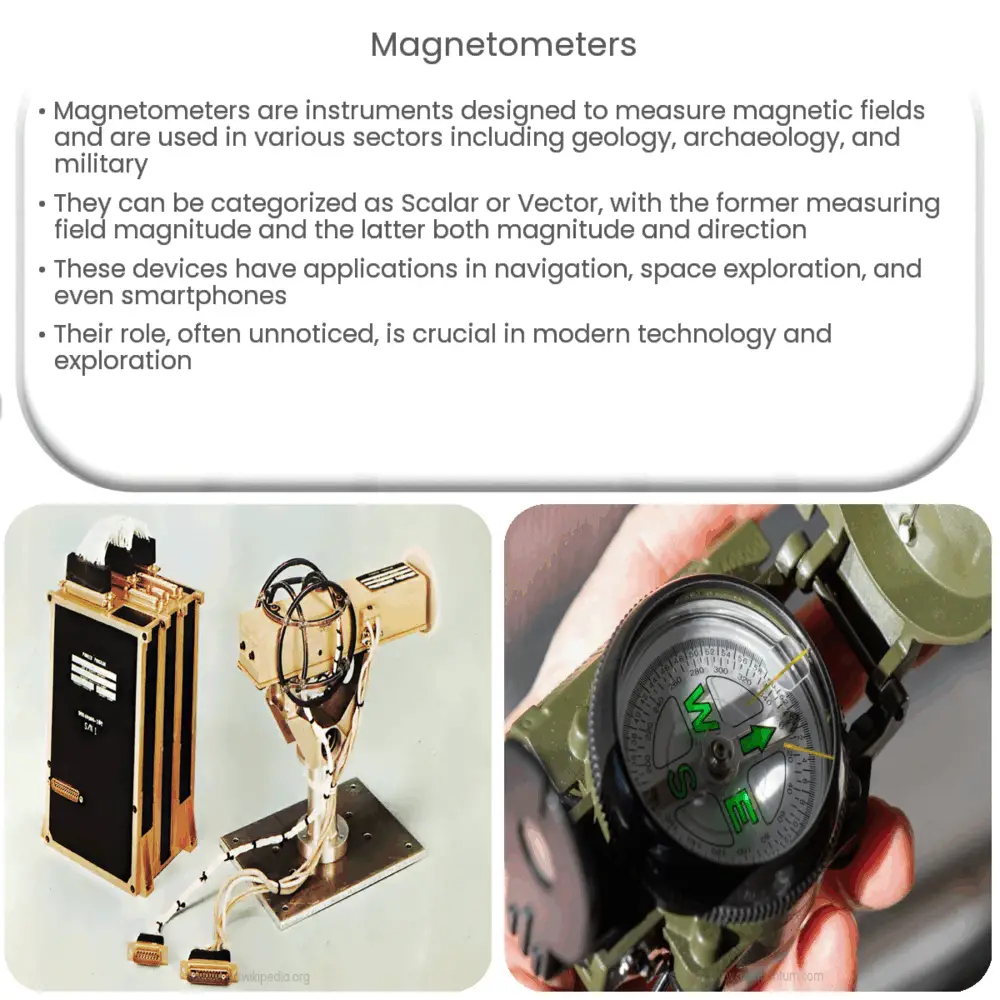Explore the world of magnetometers: their types, working principles, and diverse applications in navigation, space exploration, and more.

Magnetometers: Unseen Detectors of Magnetic Fields
Magnetometers are highly sensitive instruments designed to measure magnetic fields. These devices are utilized across a diverse range of sectors, from geology to archaeology, military, and even smartphone technology. In this article, we’ll delve into the intriguing world of magnetometers, exploring how they function, their various types, and applications.
Understanding Magnetometers
The term magnetometer is derived from two words: ‘magnet’ and the Greek word ‘metron,’ which means measure. As the name suggests, a magnetometer measures magnetism—either the magnetization of a magnetic material like a ferromagnet or the direction, strength, or relative change of a magnetic field at a particular location.
A compass is perhaps the simplest form of a magnetometer, one that measures direction relative to the Earth’s magnetic field. As technology has advanced, so has the complexity and precision of these devices.
Types of Magnetometers
Magnetometers are divided into two main categories based on their mechanism of operation: Scalar and Vector magnetometers. Scalar magnetometers measure the magnitude of the magnetic field, while Vector magnetometers measure the magnitude and direction.
- Scalar Magnetometers: Examples of scalar magnetometers include Proton Precession and Overhauser Effect magnetometers. They are less complex but provide limited information compared to their vector counterparts.
- Vector Magnetometers: These include Fluxgate, Optically Pumped, and SQUID (Superconducting Quantum Interference Device) magnetometers. They offer more detailed information, but are more complex and expensive to manufacture.
Applications of Magnetometers
Magnetometers have a wide array of uses, many of which are integral to various industries and research fields.
- Geological Surveys: Magnetometers can identify variations in the Earth’s magnetic field, providing valuable data for geological and archaeological surveys. They can detect mineral deposits or buried archaeological artifacts, respectively.
- Navigation: In navigation, magnetometers work like sophisticated compasses. They’re used in aircraft and ship navigation systems, and even in your smartphone, aiding GPS to determine the device’s orientation.
Though often unseen and unrecognized, magnetometers play a crucial role in our everyday lives. Their applications extend beyond the realms of science and into our daily routines, helping us navigate the world around us with greater precision and understanding.
More Uses of Magnetometers
- Military: In the military sector, magnetometers are used to detect submarines, magnetic mines, or other military hardware that disrupts the Earth’s magnetic field.
- Space Exploration: Space probes often carry magnetometers to measure the magnetic fields of planets and moons. They are crucial in studying the magnetosphere of these celestial bodies, helping scientists understand the solar wind’s impact and other space weather phenomena.
- Smartphones: Today, most smartphones are equipped with magnetometers. These aid in determining the phone’s orientation relative to the Earth’s magnetic field. They help in compass applications, map rotation and are integral to Augmented Reality (AR) apps.
How Magnetometers Work
While the working principle varies between different types of magnetometers, the basic premise remains the same: they all detect changes in magnetic fields. For instance, a scalar magnetometer like a Proton Precession Magnetometer works by aligning hydrogen atoms in a fluid with an external magnetic field. When the external field is removed, the protons ‘precess’ back to their original orientation, emitting a signal that can be measured and translated into magnetic field strength.
On the other hand, a vector magnetometer like a Fluxgate Magnetometer operates differently. It uses a small magnetic core wrapped with two coils of wire. When an alternating current is passed through one coil, it causes the core to magnetize and demagnetize at a rapid rate. The second coil then detects any changes in the magnetic field.
Conclusion
In conclusion, magnetometers are essential devices in our technologically advanced world. They help us navigate our surroundings, locate valuable resources, understand our planet and other celestial bodies, and even aid in national defense. As technology continues to evolve, so does the complexity and potential applications of magnetometers. Whether in the depths of the Earth, the vast expanses of space, or the smartphone in your pocket, magnetometers continue to be integral in shaping our understanding of the world and beyond.

